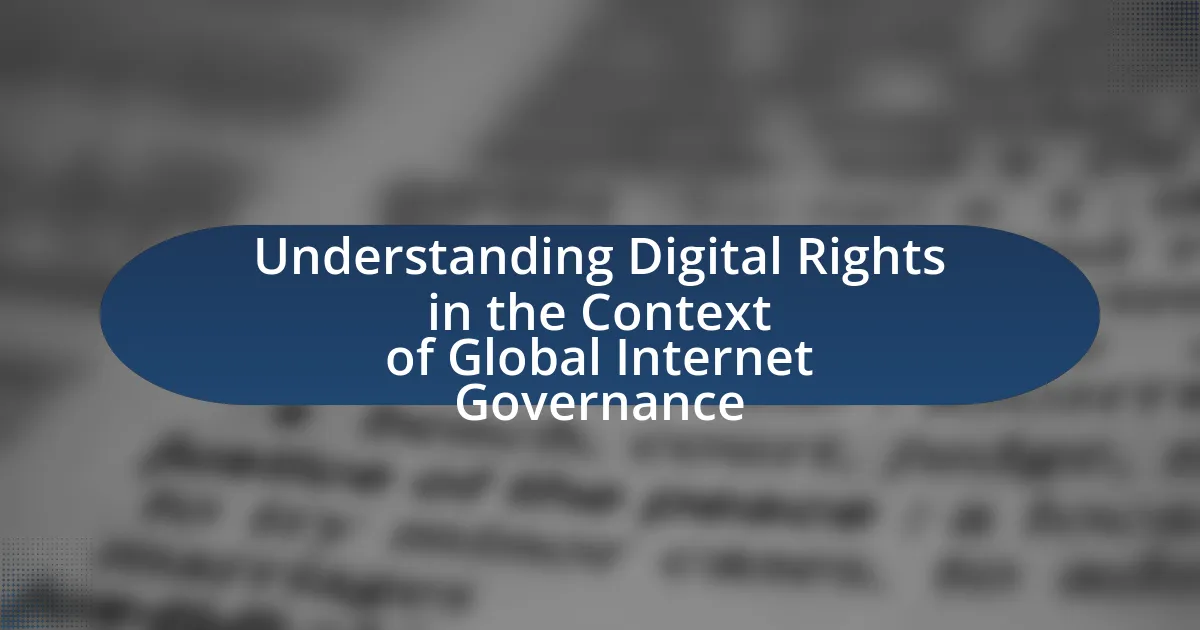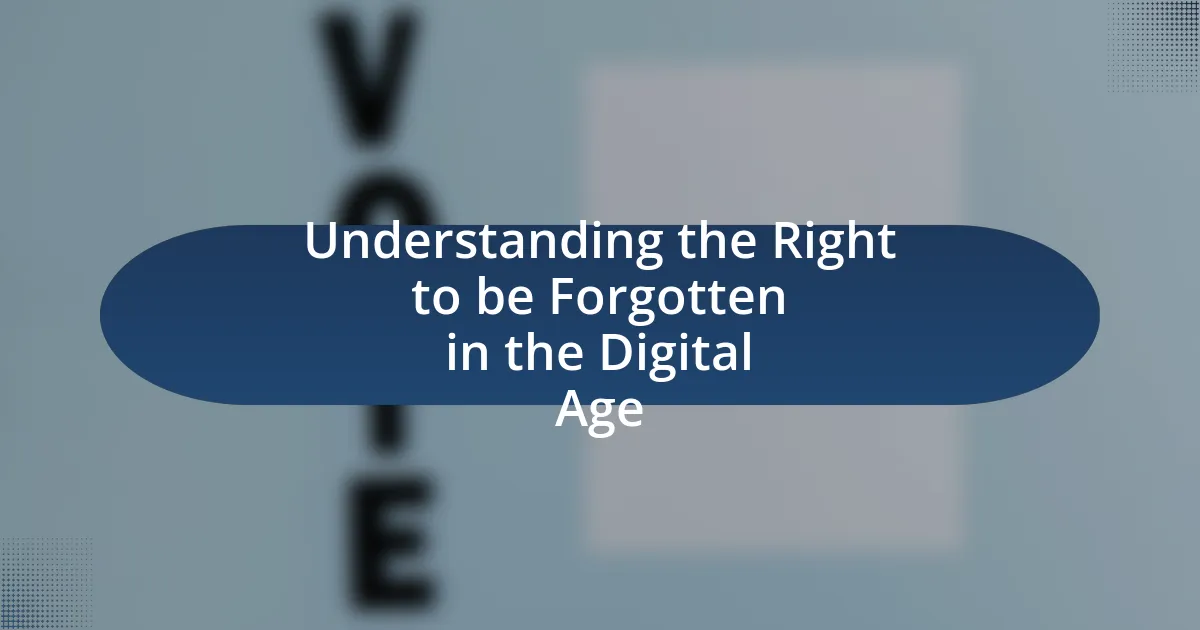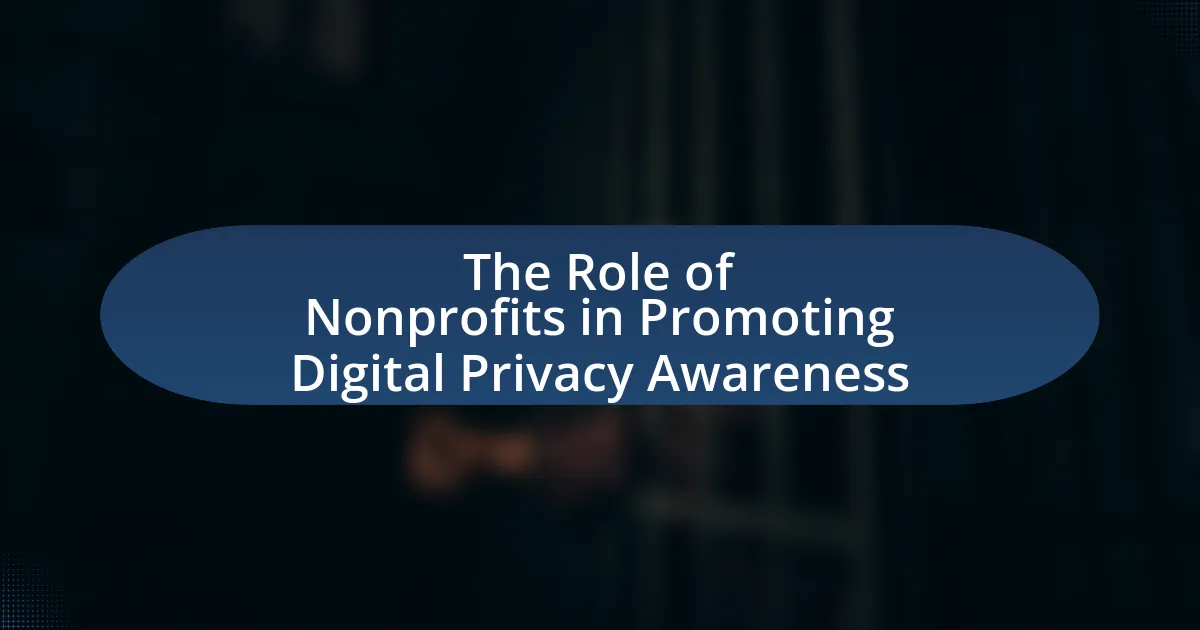Privacy advocates play a vital role in shaping digital policy by influencing legislation and promoting the protection of personal data. They engage in public awareness campaigns, provide expert testimony, and collaborate with policymakers to integrate privacy considerations into regulations. Key achievements include the establishment of the General Data Protection Regulation (GDPR) and the California Consumer Privacy Act (CCPA), which reflect the impact of advocacy on legal frameworks. The article explores the strategies employed by privacy advocates, the challenges they face, and the importance of their work in maintaining individual privacy rights in an increasingly digital world. Additionally, it highlights the future trends in privacy advocacy and the practical steps individuals can take to support these efforts.
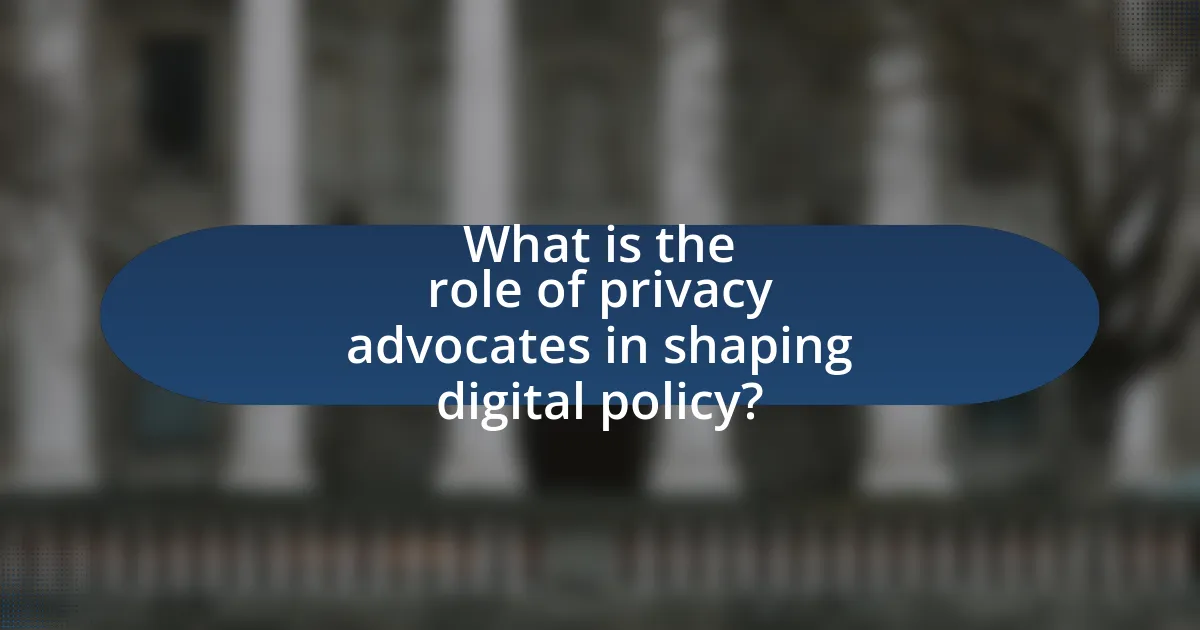
What is the role of privacy advocates in shaping digital policy?
Privacy advocates play a crucial role in shaping digital policy by influencing legislation and promoting the protection of personal data. They engage in public awareness campaigns, provide expert testimony in legislative hearings, and collaborate with policymakers to ensure that privacy considerations are integrated into digital regulations. For instance, the advocacy efforts surrounding the General Data Protection Regulation (GDPR) in the European Union were significantly driven by privacy advocates who highlighted the need for stronger data protection measures. Their contributions help to create a framework that balances technological innovation with individual privacy rights, ensuring that policies reflect the concerns of citizens regarding data security and surveillance.
How do privacy advocates influence legislation and regulations?
Privacy advocates influence legislation and regulations by actively lobbying policymakers, raising public awareness, and providing expert testimony on privacy issues. These advocates often collaborate with lawmakers to draft bills that protect personal data and promote transparency in data handling practices. For instance, the introduction of the General Data Protection Regulation (GDPR) in the European Union was significantly shaped by advocacy groups that highlighted the need for stronger privacy protections. Additionally, studies show that public campaigns led by privacy advocates can lead to increased legislative attention on privacy matters, as seen in the push for the California Consumer Privacy Act (CCPA), which was influenced by grassroots movements and advocacy organizations.
What strategies do privacy advocates use to promote their agenda?
Privacy advocates employ several strategies to promote their agenda, including public awareness campaigns, legislative lobbying, and coalition building. Public awareness campaigns aim to educate the public about privacy issues and the importance of data protection, often utilizing social media and traditional media outlets to reach a broad audience. Legislative lobbying involves engaging with policymakers to influence the creation and amendment of laws that protect individual privacy rights, such as the General Data Protection Regulation (GDPR) in Europe, which was shaped by extensive advocacy efforts. Coalition building is another key strategy, where privacy advocates collaborate with other organizations, including civil rights groups and technology companies, to create a unified front that amplifies their message and increases their influence in policy discussions. These strategies collectively enhance the visibility and impact of privacy advocacy efforts in shaping digital policy.
How do privacy advocates collaborate with policymakers?
Privacy advocates collaborate with policymakers through direct engagement, research contributions, and public awareness campaigns. These advocates often participate in legislative hearings, providing expert testimony and recommendations that inform policy decisions. For instance, organizations like the Electronic Frontier Foundation and the American Civil Liberties Union regularly submit policy briefs and engage in discussions with lawmakers to influence privacy legislation. Additionally, privacy advocates conduct research that highlights the implications of data practices, which serves as a foundation for policymakers to understand the need for regulatory changes. This collaboration is essential for creating informed policies that protect individual privacy rights in the digital landscape.
Why is the work of privacy advocates important in the digital age?
The work of privacy advocates is crucial in the digital age because they protect individuals’ rights to privacy and ensure accountability among corporations and governments. As technology advances, personal data is increasingly collected and utilized, often without consent, leading to potential abuses and violations of privacy. Privacy advocates raise awareness about these issues, promote transparency, and push for regulations that safeguard personal information. For instance, the implementation of the General Data Protection Regulation (GDPR) in the European Union was significantly influenced by advocacy efforts, demonstrating how organized advocacy can lead to substantial legal protections for individuals.
What are the key challenges faced by privacy advocates today?
Privacy advocates today face significant challenges, including the rapid advancement of technology, which complicates the enforcement of existing privacy laws. The proliferation of data collection practices by corporations and governments often outpaces regulatory frameworks, leading to gaps in protection. Additionally, public awareness and understanding of privacy issues remain low, making it difficult for advocates to mobilize support for stronger privacy protections. According to a 2021 survey by the Pew Research Center, 79% of Americans expressed concern about how their data is being used, yet many lack knowledge about their rights, highlighting the need for better education and advocacy efforts.
How do privacy concerns impact public trust in digital platforms?
Privacy concerns significantly diminish public trust in digital platforms. When users perceive that their personal data is at risk or mishandled, they are less likely to engage with those platforms. For instance, a 2021 survey by Pew Research Center found that 81% of Americans feel that the potential risks of companies collecting their data outweigh the benefits. This sentiment is reinforced by high-profile data breaches and scandals, such as the Cambridge Analytica incident, which led to a decline in user trust and engagement on Facebook. Consequently, digital platforms that prioritize transparency and robust privacy measures are more likely to foster trust among their users.
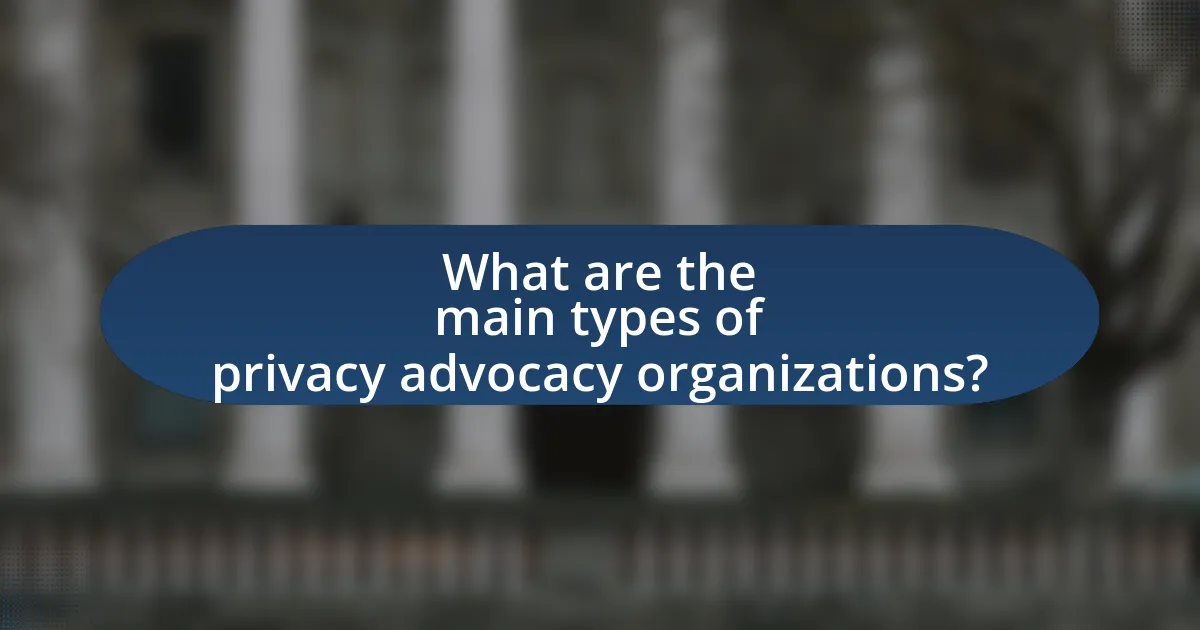
What are the main types of privacy advocacy organizations?
The main types of privacy advocacy organizations include non-profit organizations, governmental bodies, and academic institutions. Non-profit organizations, such as the Electronic Frontier Foundation and Privacy International, focus on protecting individual privacy rights and influencing policy through advocacy and public education. Governmental bodies, like data protection authorities, enforce privacy laws and regulations, ensuring compliance and addressing violations. Academic institutions contribute through research and analysis, providing evidence-based insights that inform policy discussions and advocacy efforts. These organizations collectively play a crucial role in shaping digital policy by raising awareness, influencing legislation, and promoting best practices in privacy protection.
How do different organizations approach privacy advocacy?
Different organizations approach privacy advocacy through various strategies, including legislative lobbying, public awareness campaigns, and legal action. For instance, civil liberties groups like the Electronic Frontier Foundation focus on defending individual rights in the digital space by challenging unconstitutional surveillance practices in court. In contrast, industry associations may advocate for privacy regulations that align with business interests, promoting self-regulation and compliance frameworks. Additionally, non-profits such as Privacy International engage in global campaigns to raise awareness about privacy issues and influence policy at international levels, emphasizing the need for stronger data protection laws. These diverse approaches reflect the organizations’ missions and the specific privacy challenges they aim to address.
What roles do non-profits play in privacy advocacy?
Non-profits play a crucial role in privacy advocacy by promoting awareness, influencing policy, and providing resources for individuals and organizations. These organizations often engage in public education campaigns to inform citizens about their privacy rights and the implications of data collection practices. For instance, the Electronic Frontier Foundation (EFF) actively works to protect civil liberties in the digital world, advocating for stronger privacy protections through litigation and policy initiatives. Additionally, non-profits often collaborate with lawmakers to shape legislation that safeguards personal data, exemplified by their involvement in the development of the General Data Protection Regulation (GDPR) in Europe. Through research, advocacy, and community engagement, non-profits significantly contribute to the ongoing discourse surrounding privacy rights and digital policy.
How do grassroots movements contribute to privacy advocacy?
Grassroots movements significantly contribute to privacy advocacy by mobilizing community support and raising awareness about privacy issues. These movements often engage citizens through campaigns, educational initiatives, and public demonstrations, effectively amplifying the voices of individuals concerned about their digital rights. For instance, the Electronic Frontier Foundation (EFF) has utilized grassroots efforts to influence legislation, such as the fight against the USA PATRIOT Act, showcasing how collective action can lead to policy changes that protect privacy. Additionally, grassroots movements often leverage social media platforms to disseminate information rapidly, fostering a broader understanding of privacy implications among the public. This grassroots engagement not only pressures policymakers to consider privacy in their agendas but also cultivates a culture of privacy awareness that can lead to more robust protections in digital policy.
What are the most significant achievements of privacy advocates?
Privacy advocates have achieved significant milestones in enhancing data protection and privacy rights globally. Notably, the implementation of the General Data Protection Regulation (GDPR) in the European Union in 2018 exemplifies a major success, establishing stringent guidelines for data collection and processing, thereby empowering individuals with greater control over their personal information. Additionally, privacy advocates have played a crucial role in the establishment of the California Consumer Privacy Act (CCPA) in 2020, which grants California residents rights regarding their personal data and sets a precedent for similar legislation across the United States. These achievements reflect the growing recognition of privacy as a fundamental human right and have influenced digital policy on a global scale.
How have privacy advocates influenced major data protection laws?
Privacy advocates have significantly influenced major data protection laws by raising awareness about the importance of individual privacy rights and lobbying for legislative reforms. Their efforts led to the establishment of key regulations such as the General Data Protection Regulation (GDPR) in the European Union, which was shaped by extensive advocacy campaigns highlighting the need for stronger consumer protections against data misuse. Additionally, privacy organizations have conducted research and provided evidence on the risks associated with data collection practices, which informed policymakers and contributed to the enactment of laws like the California Consumer Privacy Act (CCPA). These laws reflect the direct impact of advocacy on shaping legal frameworks that prioritize user privacy and data security.
What landmark cases have been shaped by privacy advocacy?
Landmark cases shaped by privacy advocacy include Katz v. United States (1967), which established the “reasonable expectation of privacy” standard, and Roe v. Wade (1973), which recognized a woman’s right to privacy in making medical decisions. In Katz, the Supreme Court ruled that wiretapping without a warrant violated the Fourth Amendment, emphasizing the importance of privacy in communications. Roe v. Wade further solidified privacy rights by asserting that the right to privacy extends to a woman’s decision to terminate a pregnancy, influencing subsequent privacy-related legal frameworks. These cases demonstrate the significant impact of privacy advocacy on legal interpretations and protections in the United States.
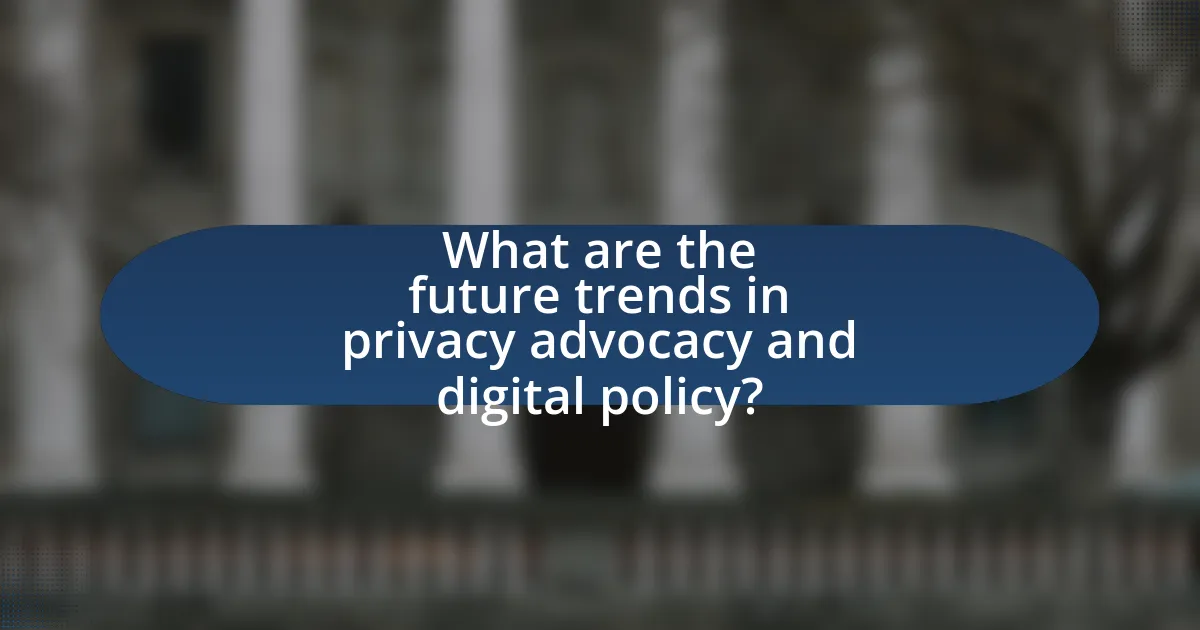
What are the future trends in privacy advocacy and digital policy?
Future trends in privacy advocacy and digital policy include increased regulatory frameworks, enhanced consumer awareness, and the integration of privacy by design in technology development. Regulatory frameworks are evolving, as seen with the implementation of the General Data Protection Regulation (GDPR) in Europe, which has set a precedent for similar laws worldwide, emphasizing the need for organizations to prioritize user privacy. Consumer awareness is rising, driven by high-profile data breaches and privacy scandals, leading individuals to demand greater transparency and control over their personal data. Additionally, the concept of privacy by design is gaining traction, encouraging companies to incorporate privacy measures into their products from the outset, rather than as an afterthought. These trends indicate a shift towards a more privacy-centric digital landscape, reflecting the growing importance of protecting individual rights in the digital age.
How is technology changing the landscape of privacy advocacy?
Technology is transforming privacy advocacy by enabling greater access to information and facilitating real-time communication among advocates, policymakers, and the public. Digital tools such as social media platforms and data analytics allow privacy advocates to mobilize support, raise awareness, and influence legislation more effectively than traditional methods. For instance, the use of online petitions and campaigns has led to significant policy changes, such as the General Data Protection Regulation (GDPR) in Europe, which was influenced by widespread public advocacy facilitated by technology. Additionally, advancements in encryption and privacy-focused technologies empower individuals to protect their data, further shifting the focus of advocacy towards user empowerment and corporate accountability.
What emerging issues are privacy advocates focusing on?
Privacy advocates are focusing on issues related to data protection, surveillance, and the implications of artificial intelligence on personal privacy. These concerns have intensified with the rise of technologies that enable mass data collection and monitoring, such as facial recognition and location tracking. For instance, a report by the Electronic Frontier Foundation highlights the risks of government surveillance programs and their impact on civil liberties. Additionally, privacy advocates are addressing the challenges posed by data breaches and the need for stronger regulations to protect consumer information, as evidenced by the increasing number of high-profile data leaks in recent years.
How can privacy advocates adapt to evolving digital environments?
Privacy advocates can adapt to evolving digital environments by continuously updating their strategies to address emerging technologies and regulatory changes. This involves staying informed about advancements in artificial intelligence, data analytics, and privacy legislation, which can significantly impact user data protection. For instance, the General Data Protection Regulation (GDPR) in Europe has set a precedent for privacy laws globally, prompting advocates to push for similar regulations in other regions. Additionally, engaging in collaborative efforts with tech companies, policymakers, and civil society organizations can enhance their influence and effectiveness in shaping digital policy. By leveraging data-driven insights and public awareness campaigns, privacy advocates can effectively respond to the dynamic landscape of digital privacy challenges.
What practical steps can individuals take to support privacy advocacy?
Individuals can support privacy advocacy by educating themselves about privacy issues and sharing this knowledge with others. By understanding the implications of data collection and surveillance, individuals can engage in informed discussions and raise awareness within their communities. Additionally, individuals can participate in advocacy groups or campaigns that promote privacy rights, such as signing petitions or attending rallies. Supporting legislation that protects privacy, like the General Data Protection Regulation (GDPR) in Europe, is another practical step. Furthermore, individuals can adopt privacy-focused technologies, such as encrypted messaging apps and privacy-centric browsers, to enhance their own digital security while promoting these tools to others. Engaging in these actions contributes to a collective effort to influence digital policy and protect individual privacy rights.
How can individuals engage with privacy advocacy organizations?
Individuals can engage with privacy advocacy organizations by becoming members, participating in campaigns, volunteering, and donating. Membership often provides access to resources and updates on privacy issues, while participation in campaigns allows individuals to amplify advocacy efforts. Volunteering can involve assisting with events or outreach, and donations help sustain the organization’s initiatives. According to the Electronic Frontier Foundation, active engagement from individuals is crucial for influencing policy changes and raising awareness about privacy rights.
What resources are available for those interested in privacy issues?
Numerous resources are available for individuals interested in privacy issues, including organizations, websites, and publications dedicated to privacy advocacy. Notable organizations such as the Electronic Frontier Foundation (EFF) and the Privacy Rights Clearinghouse provide extensive information on privacy rights, legal frameworks, and best practices for protecting personal data. Additionally, websites like Privacy International and the Center for Democracy & Technology offer research, reports, and tools to help individuals understand and navigate privacy concerns. Publications such as “Privacy in the Digital Age” by the American Civil Liberties Union (ACLU) further contribute to the discourse by analyzing current privacy challenges and proposing policy solutions. These resources collectively empower individuals to engage with privacy issues and advocate for stronger protections.



